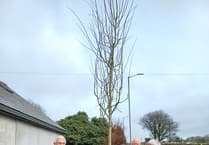By Lee Trewhela - LDRS
Residents of a Cornish town have been asked to be “kind to one another” after a controversial scheme spearheaded by Sir Tim Smit, which was originally refused by planners last year, has been lodged again in amended form.
Plans to build a clubhouse and reception at Gillyflower Golf Course in Lostwithiel, along with 19 holiday lodges, have been submitted by the Eden Project co-founder’s son Alex.
Under the original plans the Smits wanted to create a horticulture, agronomy and cookery education centre along with 19 holiday lodges, a cafe and facilities and a new reception for the golf club on the site on the outskirts of Lostwithiel.
Cornwall councillors refused planning permission for the project on April 12, 2002 saying that it would cause harm to the landscape and historic assets. More than 300 people had submitted objections to the application on the council’s website, and there had been protests against the plans in Lostwithiel.
Council planning officers had recommended that the plans should be approved saying that while there would be some harm to the Area of Great Landscape Value (AGLV) and heritage assets they considered that the economic benefits of the scheme outweighed the harm.
However, Lostwithiel Town Council and local Cornwall councillor Colin Martin had objected with concerns about the impact of the development as well as highways concerns and the effect it could have on the town. Cornwall CPRE, which keeps a close eye on planning applications across the county, welcomed the council’s decision, saying the site is close to ancient monuments – Restormel Castle and Roman Fort and Lanhydrock Registered Parks and Gardens and the undesignated heritage asset The Deer Park.
Cllr Martin said this week: “The last application on this site led to a great deal of division and bad feeling in a town which has always been famous for its warm community spirit. The new application includes some significant changes to reduce the visual impact of the main building, but some other issues are still causing concern.
“I will do my best to ensure that all views are genuinely heard and that the proper process is followed. Above all, I hope that people will be kind to one another in the way they debate this application. It is just as important to protect the community as it is to protect the physical environment.”
A planning statement, on behalf of Alex Smit, states: “The key vision for the site, since it was acquired by the applicants in 2016, was to turn part of the (at that time) disused golf course into the greatest rare fruit orchard in Europe. From a horticultural perspective, the aim is for the preservation of rare and historic varieties of fruit trees and vegetables.
“To date, over 3,500 trees have been planted as part of this effort, with a new ‘Potager’ (vegetable garden) alongside this, modelled on the walled garden at Heligan, acting as a reservoir of rare European vegetables. Fruit and nut trees have been planted across the newly regenerated golf course and edible planting will be cultivated around the proposed lodge buildings in order that the proposed development is surrounded by, and is integrated into, this newly planted agricultural landscape. As part of this vision, the applicant seeks to cultivate a range of crops that can be grown by partner farmers and growers, and become a new range of economic crops that allows Lostwithiel to develop into a centre for the development of new food crops.
“The proposal seeks to expand the facilities on offer at the existing golf course, which will bring it back towards providing a full-service facility, as existed prior to 2014. Substantial investment, landscaping and planting has been undertaken to bring the golf course (which is located over the road to the west of the application site and set within the valley on the banks of the River Fowey) back into use. It has been reduced in scale and re-sculpted to an 18-hole / nine green golf course, to enable an 18-hole round to be played.
“The proposal would introduce 19 holiday lodges (referred to as Drums) which would be part of an aparthotel facility (fully serviced apartments, falling within Class C1) to be managed by the clubhouse and complement the golf course, and would benefit from the wider fruit orchards and new landscaping located both on and off the golf course. By providing accommodation, further benefit will be derived for Lostwithiel as guests would spend money in the town. The scheme includes appropriate access and parking arrangements to service the site.
“Given the refusal basis, the present proposal has a substantially reduced built form and the main Hub building has been removed, with a more modest and sensitively designed clubhouse included to serve the golf course (which currently has no permanent facilities).”
Parking would increase from the current 30 spaces to 66 alongside 40 new cycle spaces and two motorbike spaces.
Although the plans only went on Cornwall Council’s planning portal a few days ago, residents have started commenting.
Anthony Pearce said: “My objection to this planning application has to be an honest opinion of the damage that would be created in this beautiful valley, the visual impact against what has existed for many generations, who regarded their valley as historically valued for the history that has developed over centuries of disturbances. Also, the visual impact and the light pollution that would be clearly seen from many areas of the surrounding countryside and the towns dwellings.”
Amanda Barrass added: “Literally ‘a year to the day’ that Cornwall Council’s Strategic Planning Committee decided not to support this applicant’s previous application on this site, a subsequent planning application has been submitted. The crux of this application being unacceptable is the fact that it would result in a significant development on a greenfield site, within an Area of Great Landscape Value (AGLV).”
Sir Tim addressed the planning committee at last April’s meeting and said it was “a matter of regret” that the application had divided opinions in Lostwithiel. But he said that he and his son were sure that the development would be sustainable and help not just the local community but also benefit the wider population in learning and developing learning about horticulture and agronomy.
He said that they were working with a number of educational institutions including Exeter and Plymouth universities to set up training and research programmes which would run from the farm. He added that the golf club and holiday lodges would help to generate income which would help to fund the educational aspects of the new venture.




